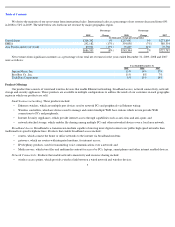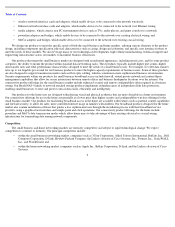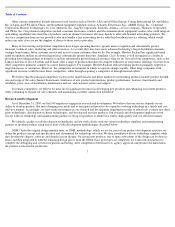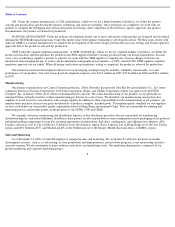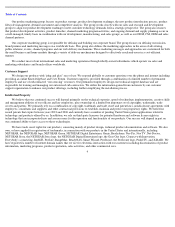Netgear 2009 Annual Report Download - page 17
Download and view the complete annual report
Please find page 17 of the 2009 Netgear annual report below. You can navigate through the pages in the report by either clicking on the pages listed below, or by using the keyword search tool below to find specific information within the annual report.
Table of Contents
Changes in tax rates, adverse changes in tax laws or exposure to additional income tax liabilities could affect our future profitability.
Factors that could materially affect our future effective tax rates include but are not limited to:
We are subject to income taxes in the United States and numerous foreign jurisdictions. Our effective tax rate has fluctuated in the past and
may fluctuate in the future. Future effective tax rates could be affected by changes in the composition of earnings in countries with differing tax
rates, changes in deferred tax assets and liabilities, or changes in tax laws. Recently announced proposals for new US tax legislation proposed by
President Obama’s administration could also adversely affect our tax rate if adopted.
We are also subject to examination by the Internal Revenue Service (“IRS”) and other tax authorities, including state revenue agencies and
foreign governments. While we regularly assess the likelihood of favorable or unfavorable outcomes resulting from examinations by the IRS and
other tax authorities to determine the adequacy of our provision for income taxes, there can be no assurance that the actual outcome resulting
from these examinations will not materially adversely affect our financial condition and operating results. Additionally, the IRS and other tax
authorities have increasingly focused attention on intercompany transfer pricing with respect to sales of products and services and the use of
intangible assets. Tax authorities could disagree with our intercompany charges, cross-jurisdictional transfer pricing or other matters and assess
additional taxes. Any such disagreements may affect our profitability.
We have had to restate our historical financial statements.
In July 2009, we announced that we had incorrectly reported our income tax provision for the three months ended March 29, 2009 and, as a
result of this error, we restated the financial statements in our quarterly report on Form 10-Q for the three months ended March 29, 2009. The
restatement, which related solely to the correction of the income tax provision for the three months ended March 29, 2009, resulted in
adjustments related to income taxes in our financial statements. In our previously filed financial statements for the three months ended March 29,
2009, we incorrectly included a particular foreign entity in calculating our estimated annualized tax provision. This foreign entity should not
have been included in the calculation because the anticipated losses in that entity would not give rise to tax benefits. While our overall annual tax
provision was not be affected for the entire year, we made an error in inter-quarter allocations of the tax provision. Material changes to our
previously reported financial information occurred as a result of this error.
In connection with this restatement we identified certain control deficiencies relating to the application of applicable accounting literature
related to recordation of tax expenses. These deficiencies constituted a material weakness in internal control over financial reporting as of
March 29, 2009, which led to items requiring correction in our financial statements and our conclusion to restate such financial statements to
correct those items. Specifically, the control deficiencies related to our failure to correctly apply the authoritative guidance for income taxes in
determining the proper allocation of our annualized tax provision.
Although this material weakness has been remediated by December 31, 2009, we cannot be certain that the measures we have taken since
this restatement will ensure that restatements will not occur in the future. Execution of restatements like the one described above create a
significant strain on our internal resources and could cause delays in our filing of quarterly or annual financial results, increase our costs and
cause management distraction. Restatements may also significantly affect our stock price in an adverse manner.
15
•
Changes in the regulatory environment;
•
Changes in accounting and tax standards or practices;
•
Changes in the composition of operating income by tax jurisdiction; and
•
Our operating results before taxes.


